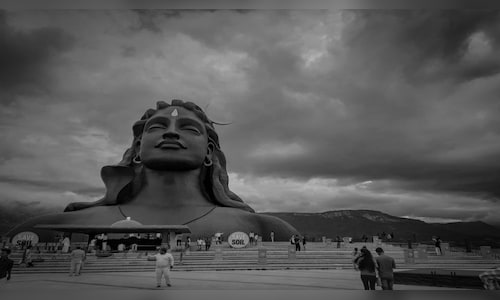The Lankesh Bhakt Mandal, which has been campaigning against the burning of Ravan’s effigy for over two decades, staged a symbolic protest on October 2 by performing aarti of Ravan’s idol on the banks of the Yamuna river. The group recited mantras from morning to evening, seeking wisdom for society.
“Lankapati Ravan was a devout follower of Lord Shiva, a teacher of Lord Ram, a profound scholar, a seer of all three times and the composer of the Shiva Tandav Stotra. Burning his effigy repeatedly is an insult to Sanatan Dharma,” said Omvir Saraswat, president of the mandal, according to PTI.
He equated the act of burning effigies to committing a grave sin, like the killing of cows. Moreover, he raised concerns about the environmental impact and safety risks associated with the practice.
Also read | Heard of a water-resistant Ravan effigy? This 221 feet statue is set to enter record books
Instead of effigy-burning, the group has suggested more educational alternatives such as dramatic reenactments of the battle between Lord Ram and Ravan to help future generations understand the nuances of the epic.
“According to Hindu belief, a person is cremated only once, not repeatedly. The practice of burning effigies is against the spirit of Sanatan Dharma,” Saraswat added, urging government intervention to discourage the ritual.
The Lankesh Bhakt Mandal comprises young Brahmins who believe that Ravan himself belonged to the same Brahmin lineage. They regard Ravan as a misunderstood figure whose devotion and scholarship deserve reverence, not vilification.
Adding to this alternative perspective, a temple in Kanpur’s Shivala area dedicated to Ravan opened its doors on Vijaya Dashami, the only day in the year when worship is permitted. Devotees visited the temple from 6 am to 8:30 pm to offer prayers before the evening’s symbolic burning of effigies took place elsewhere in the city.
Also read | From 215-foot Ravana effigy to eco-friendly prasad boxes: How cities are celebrating Dussehra 2025
“Devotees light mustard-oil diya here and women offer torai (ridge gourd) flowers for marital blessings. In the morning, we celebrate Ravan’s birthday. At night, Lord Ram grants him salvation and Ravan departs for Vaikunth Dham (heaven),” said temple priest Chandan Maurya.
Locals noted that thousands visit the temple on Dussehra, choosing to pay respect to Ravan’s virtues as a scholar, king, and devotee — even as his symbolic defeat plays out across India by sundown.
Together, these voices and traditions offer a compelling reminder of the diversity of beliefs within Hinduism, and of the layers of meaning that can be found in even the most familiar rituals.






